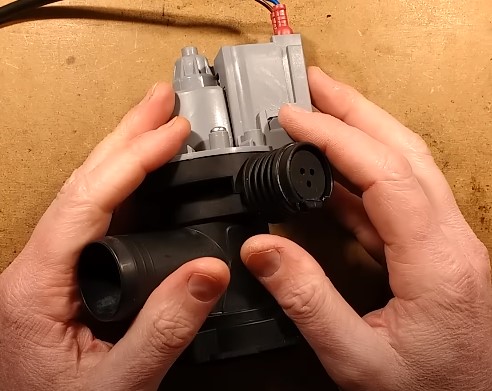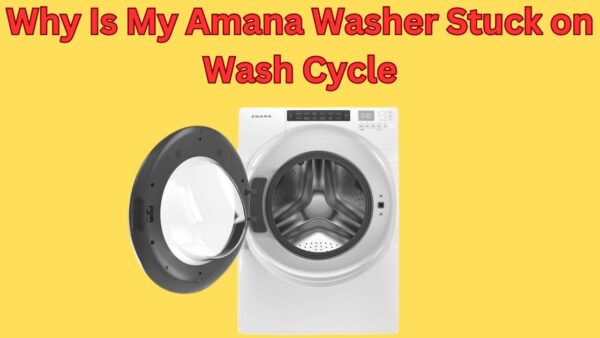A washing machine is an essential household appliance, and its smooth operation is crucial for the daily routine of many families.
However, like any machine, a washing machine can break down over time, and one common issue users face is a broken pump.
The pump is a key component that circulates water in the machine during various stages of a wash cycle.
When it fails, it can lead to inefficient washing or even total machine breakdown.
Understanding the common causes of pump failure can help in preventing these issues, ensuring a longer life for your machine. This article will explore 15 common reasons why a washing machine pump might break.
What Causes a Washing Machine Pump to Break

1. Overloading the Machine
Reasons
Overloading your washing machine poses a serious risk to its pump. When too much laundry is added, the machine works harder than it’s designed to.
This excessive strain can cause the pump to fail prematurely as it struggles to effectively manage the volume of water required for the added load.
Solution
To prevent pump damage due to overloading, it’s important to adhere to the manufacturer’s recommendations regarding load size.
It might be tempting to wash larger loads to save time or energy, but consistently doing so can lead to costly repairs or even machine replacement.
Regularly maintaining your washing machine and not exceeding its capacity will ensure its longevity and optimal performance.
2. Using Too Much Detergent
Reasons
Excessive detergent usage can lead to several problems for your washing machine’s pump.
The surplus soap creates an overflow of suds that can clog and potentially damage the pump.
Furthermore, it might leave a soapy residue in the machine, impeding the proper functioning and efficiency of the pump over time.
Solution
The solution to this problem is straightforward: Always adhere to the recommended detergent dosage specified by the machine’s manufacturer.
Also, consider using high-efficiency (HE) detergents, which are designed for modern washing machines and create fewer suds.
Regularly cleaning your washing machine will also help remove any soap residue and prevent clogs, thereby prolonging the life of your machine’s pump.
3. Long-Term Wear and Tear
Reasons
Just like any other machine, washing machines are not immune to the natural process of wear and tear.
Over time, the constant cycle of filling and draining water can lead to the gradual wearing down of the pump.
The pump’s components such as the impeller and seal can also become worn out due to continued use, leading to a decrease in the pump’s effectiveness.
Solutions
The primary solution to long-term wear and tear is regular maintenance and servicing of your washing machine.
This includes cleaning the pump filter, checking for blockages, and ensuring that the pump’s components are in good working condition.
In cases where the pump is severely worn out, it may be necessary to replace it with a new one.
Always consult a professional technician when dealing with such issues to ensure the longevity of your washing machine.
4. Improper Installation
Reasons
Improper installation can lead to multiple issues with your washing machine pump.
If the machine is not leveled correctly, the pump can become strained and overwork itself, leading to premature failure.
Inaccurate connections of the pump to the machine can also result in leaks, which can cause the pump to break over time.
Solution
The solution to this issue is ensuring proper installation from the outset.
It’s recommended to use a professional installer who understands the nuances of washing machine setup.
They can ensure the machine is leveled accurately and all connections are secure. Regular checks to ensure the machine remains level can also help prevent undue strain on the pump.
5. Electrical Faults
Reasons
Electrical faults can be a primary cause of washing machine pump failure.
They may arise from internal issues such as faulty wiring, power surges, or even the degradation of the pump’s motor over time.
Regular use of the washing machine puts a strain on its electrical components, which can eventually lead to an electrical fault.
Solution
The most effective way to deal with electrical faults in a washing machine pump is to seek professional help.
Qualified technicians have the necessary skills and equipment to safely diagnose and repair electrical issues.
In some cases, it might be necessary to replace the pump entirely.
Regular maintenance can also prevent the occurrence of electrical faults, thus prolonging the lifespan of your washing machine.
6. Clogged Drain Hose
Reasons
A clogged drain hose in a washing machine can occur due to several factors.
Over time, lint, dirt, and leftover detergent can accumulate in the hose, building up to form a blockage.
Additionally, small clothing items like socks and underwear can sometimes find their way into the hose during a wash cycle and cause a clog.
Solution
To rectify a clogged drain hose, start by turning off and unplugging the washing machine.
Remove the hose and inspect it for visible blockages, which you can remove manually.
If the clog is from lint or detergent build-up, consider soaking the hose in a solution of warm water and vinegar to dissolve the blockage.
Once clean, reattach the hose, ensuring it’s securely fastened. If these steps don’t work, it may be necessary to replace the hose altogether.
7. Faulty Motor
Reasons
A washing machine motor can become faulty due to a variety of reasons.
Over time, the motor can endure regular wear and tear, leading to decreased performance and eventually failure.
Other common causes include overloading the machine, which can put excess strain on the motor, and electrical surges, which can damage the motor’s electrical components.
Solution
The solution to a faulty washing machine motor depends on the specific cause of the problem.
In the case of wear and tear, the motor may need to be replaced entirely. If the issue is due to overloading, adjusting the load size in future washes could prevent further damage.
For electrical issues, it might be necessary to repair or replace the motor’s electrical components. In all cases, it is advised to consult a professional for a proper diagnosis and repair.
8. Excessive Lint Buildup
Reasons
Excessive lint buildup in a washing machine can occur due to a variety of reasons.
The most common is frequent washing of high-lint-producing fabrics like towels and flannel.
Over time, these fabric fibers accumulate in the machine, resulting in a lint buildup.
If your washing machine lacks a lint filter or the filter is ineffective, the possibility of lint accumulation increases significantly.
Solution
To solve the problem of excessive lint buildup, it’s crucial to clean your washing machine regularly.
This can be done by running an empty wash cycle with hot water and a cup of distilled white vinegar, which helps dissolve the lint.
If your machine has a lint filter, ensure it’s cleaned after every wash.
It’s also advisable to shake out your clothes before washing to get rid of any loose lint and consider using washing bags for high-lint-producing fabrics.
9. Trapped Items Machine
Reasons
The Trapped Items Machine issue typically occurs when small items such as coins, keys, or socks get trapped in the washing machine pump during a wash cycle.
These items may get caught in the pump’s impeller, causing it to jam and prevent water from circulating effectively.
This can lead to the pump overheating and eventually breaking down.
Solution
To prevent this issue, it’s advisable to check all pockets and remove small items before loading your laundry into the machine.
If the pump is already jammed, you may need to manually unclog it. If the problem persists or the pump has been damaged, you may need to seek professional help or consider replacing the pump.
10. Inadequate Maintenance
Reasons
Inadequate maintenance is one of the leading causes of washing machine pump failures.
It often stems from negligence, such as not cleaning the machine regularly or overloading it consistently.
Over time, this lack of maintenance can lead to the accumulation of lint and other debris within the pump, which can cause clogging and impede its normal function.
Solution
To prevent pump failure due to inadequate maintenance, it is important to develop a regular cleaning routine for your washing machine.
This should include removing and cleaning the lint filter after each wash and periodically checking the hoses and seals for any signs of wear and tear.
If you notice any unusual noises or decreased efficiency, it’s advisable to consult a professional to diagnose and fix the issue before it escalates.
11. Poor Quality Spare Parts
Reasons
Poor quality spare parts can lead to the premature failure of your washing machine’s pump.
Such parts are often made from inferior materials and do not meet the manufacturer’s exact specifications, resulting in diminished performance and durability.
They can cause undue stress on the pump, leading to its eventual breakdown.
Solution
The best solution to counter the problem of poor quality spare parts is to always purchase original equipment manufacturer (OEM) parts.
These are designed specifically for your machine and uphold the quality standards set by the manufacturer.
Although they may be more expensive, OEM parts will ensure your washing machine pump operates optimally and lasts longer, saving you from frequent repair or replacement costs.
12. Age of the Machine
Reasons
The age of a washing machine plays a significant role in the breakdown of its pump.
Over time, constant use can contribute to wear and tear, leading to a decrease in the efficiency of the pump.
Older machines may also have outdated components that are more prone to breaking down compared to their newer, more robust counterparts.
Solution
If your washing machine is old and the pump has broken, it might be more cost-effective to replace the entire machine rather than replace the pump alone.
Newer models are more energy-efficient and come with improved features.
However, if replacement is not a viable option, consider hiring a professional technician for a thorough inspection and repair or replacement of the pump.
13. Fluctuation in Power Supply
Reasons
Fluctuations in the power supply can severely impact the operation of a washing machine pump.
High power surges or too low voltages can lead to overheating or underperformance of the pump motor, respectively.
Over time, these irregularities in the power supply can cause damage to the pump’s mechanical components, leading to eventual failure.
Solution
To mitigate issues caused by power fluctuations, consider installing a voltage stabilizer.
This device will regulate the power supply to the washing machine, ensuring a consistent voltage level and protecting the pump from potential damage.
Regular maintenance checks of your home’s electrical system can also help identify and rectify power issues before they affect your appliances.
14. Leakage in the Pump
Reasons
Leakage in a washing machine pump often results from wear and tear over time.
Also, constant exposure to hard water can lead to corrosion of the pump’s components, which eventually causes leaks.
Improper installation or a faulty seal can also contribute to leakage.
Solution
Fixing a leaking washing machine pump usually involves identifying the source of the leak and replacing the faulty components.
In cases of severe corrosion or damage, it may be necessary to replace the entire pump.
It is recommended to seek assistance from a professional appliance repair service to ensure a proper and safe repair.
15. Hard Water Usage
Reasons
Hard water is a common culprit behind washing machine pump failure.
The high mineral content in hard water, particularly calcium, and magnesium, can lead to limescale buildup within the pump.
Over time, this buildup can cause considerable strain on the pump, impeding its function and eventually leading to breakdown.
Solution
To counteract the damaging effects of hard water on your washing machine pump, consider using a water softener.
Water softeners work by replacing the hard minerals in the water with softer ones, such as sodium or potassium.
This can significantly reduce the limescale buildup within the pump, thereby prolonging its lifespan and ensuring optimal performance of your washing machine.
Conclusion
In conclusion, the washing machine pump can break due to several reasons such as blockages from small objects or lint, mechanical failure, or wear and tear over time.
Regular maintenance and proper use of the machine can help prevent these issues and prolong the life of the pump.
Remember, if you are not comfortable performing these checks or repairs yourself, it is advisable to hire a professional to ensure safety and effectiveness.
FAQs
Why is my washing machine drain pump not working?
Your washing machine drain pump may not be working due to a blockage in the pump or the hose, or it could be a result of a faulty motor.
Can overloading a washing machine break the pump?
Yes, overloading a washing machine can indeed break the pump as it puts additional strain on the motor, causing it to overheat or potentially fail.
Is it worth replacing the pump on the washing machine?
It can be worth replacing the pump on a washing machine, especially if the machine is relatively new and the cost of the pump replacement is significantly less than purchasing a new unit.
What blocks a washing machine pump?
A washing machine pump can get blocked by small items like coins, hair, lint, or even parts of clothing that somehow find their way there. Accumulation of detergent or fabric softener residue can also cause blockages.
Kenmore Washer Lid Lock Flashing
Why Is My New Whirlpool Washer So Loud
Dryer Taking Multiple Cycles to Dry
Amana Dryer Stopped Working Mid Cycle
Whirlpool Washer Stops Mid Cycle
Whirlpool Washer Not Agitating Properly
Whirlpool Washer Won’t Agitate but Will Spin
Whirlpool Washer Locked Light Flashing
Kenmore Dryer Keeps Shutting Off
Samsung Washing Machine No Power No Lights
Front Load Washer Filling With Water When Off
Whirlpool Washer Door Locked Flashing and Pump Running
Bosch Washing Machine Won’t Start Just Beeps
Why Is My Amana Washer Stuck on Wash Cycle
Washing Machine High-Pitched Noise


